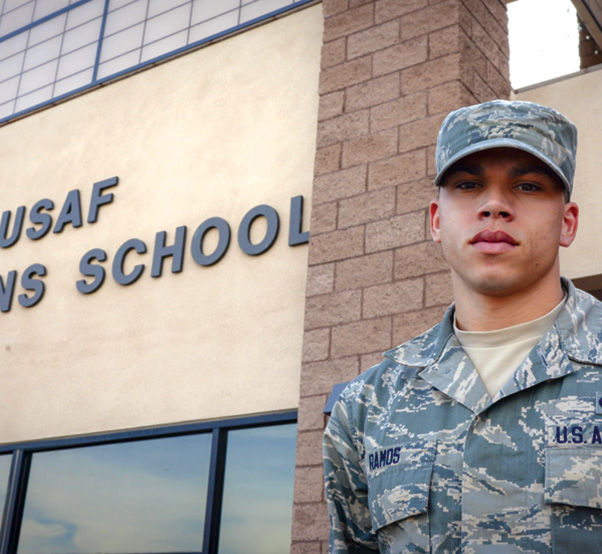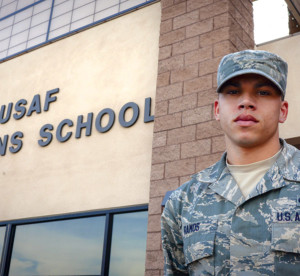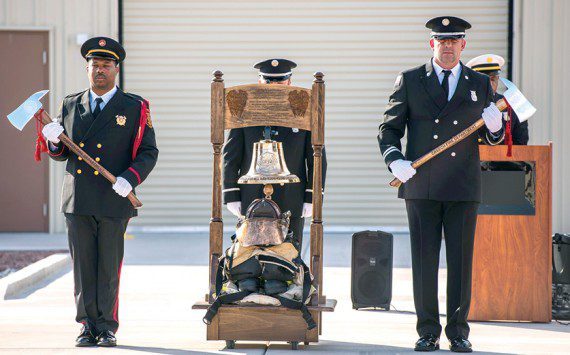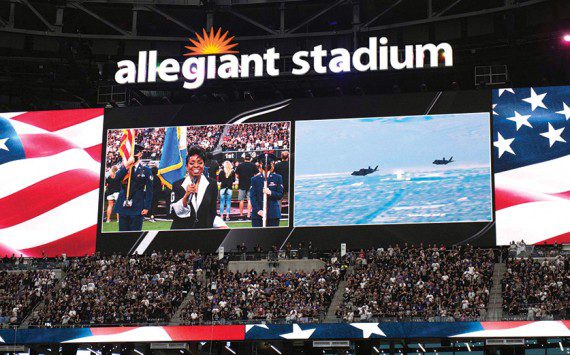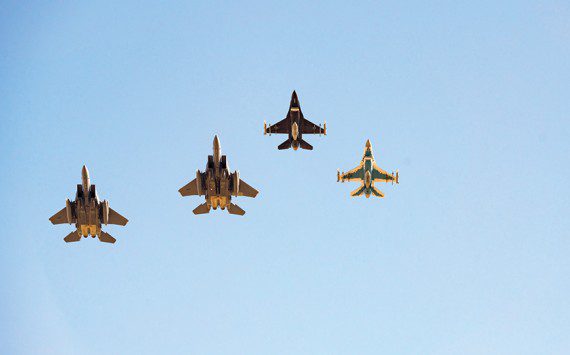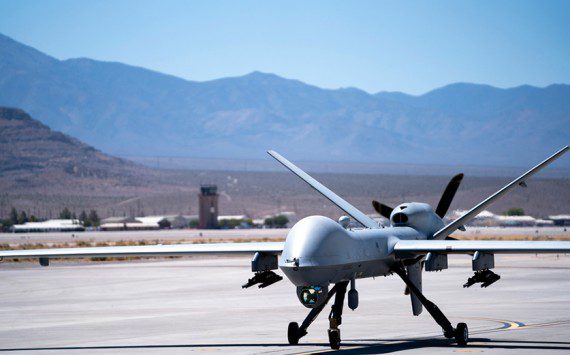Senior Airman Edward Ramos, United States Air Force Weapons School command section administrator, poses in front of the USAFWS at Nellis Air Force Base, Nev., April 4. Ramos assisted four passengers who were in a car wreck on March 25.
NELLIS AIR FORCE BASE, Nev. — What is it to be a hero? When hearing this word, one probably automatically associates it with ‘super’ in front of it or pictures a caped crusader. One tends to lose sight that there are real-life heroes performing brave acts every day, but what defines what it really means to be a hero?
There is no exact definition. The truth is that a hero is often simply an ordinary person in extraordinary circumstances who prevails in the end. They make a difference in someone’s life, no matter how big or small. A hero is someone who people can look up to, and help others regardless of their convenience.
Senior Airman Edward Ramos, U. S. Air Force Weapons School command section administrator, displayed the characteristics of a hero when he was faced with an extraordinary circumstance driving home on the night of March 25, 2016.
“I got off early from work and I was going home to San Diego,” said Ramos. “I was driving on Interstate 15 South and the moment I hit my halfway mark, Barstow County, is when the accident happened. I was behind a big rig and I saw a car slowing down and what I thought was a dust cloud was in fact the small sedan flying in the air toward the barrier on the left shoulder of the freeway.
“The back rear tire had blown out and caused the accident. The car, thankfully, stayed upright and on the southbound side of traffic. If it had gone over the barrier onto the northbound side of traffic, the passengers may not have walked away alive from it.”
Ramos, without hesitation, jumped out of his car and raced to assist the four passengers that were still buckled in the damaged car. A bystander in a tow truck grabbed his fire extinguisher and put out the smoke that was coming from the car while Ramos began to assess the scene and help the passengers.
“The two passengers in the front had minor scratches; I was still able to get them out in no time,” said Ramos. “As for the other two passengers in the back, it was much harder to get them out because both doors were smashed in, and I was unable to pry the doors open myself.”
Ramos began to look over the car to see if there was another entry point to reach the passengers that were still inside.
“I noticed that the sunroof in the car was completely broken, so I knew I could jump through,” said Ramos. “Once I was in the car, I unbuckled both seatbelts of the passengers. One of them was okay to move, so I told him that he would have to crawl out the sunroof, and I would help him down.
“When only one passenger was left in the car, an off-duty fireman came to the side of the door and asked me what injuries the guy had. The passenger let me know that his arm was banged up and his lower back hurt. At that moment, the off-duty fireman informed me not to touch him and to wait for California Highway Patrol and ambulances to arrive.”
Ramos and the others took it upon themselves to try and get the door open before ambulances or firefighters showed up so that they could get him out faster once they arrived.
“To pry open the back passenger door, the tow-truck guy grabbed a 4-foot medal rod from his truck, and we proceeded to get the door open. We finally got the door off before the County Fire Department showed up. The whole situation took maybe 30 minutes and we spent another 20 minutes waiting for CHP to arrive. It was an intense situation that was handled with the upmost care by everyone involved. I couldn’t be happier that no one was seriously injured.”
Once the situation was over Ramos called to let his supervisor know what had happened and his reaction was unexpected.
“I was at dinner when I received the call and I just said ‘see you on Monday,’ stated Staff Sgt. Richard Garcia, USAFWS NCO in in-charge of the command section. “I wasn’t shocked; it was nothing short of what I expect of him. He does exceptional things at work already and doing things that we don’t expect of him. It didn’t surprise me because that is the type of person he is and I’m really proud of him.”
Garcia stated that even though Ramos didn’t have to use the training that the Air Force provides like Self-Aid Buddy Care in this particular situation it still played a role, as the training one receives in the Air Force instills that initiative to jump in and help.
When Ramos was faced with this situation he could have just driven on by and continued on his way home. Instead, he put the well-being of others ahead of himself and became a real-life hero to those four passengers that night.






